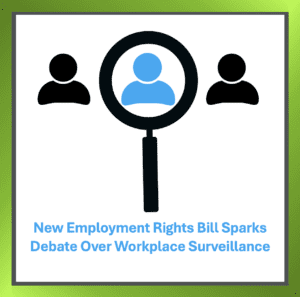New Employment Rights Bill Sparks Debate Over Workplace Surveillance
The Employment Rights Bill, recently proposed by Deputy Prime Minister Angela Rayner, has stirred significant debate across business circles in the country. Aimed at reinforcing protective measures against workplace harassment, the Bill mandates the appointment of diversity officers within companies to monitor and handle conversations that may be deemed inappropriate or offensive. This new requirement raises several concerns, ranging from potential impacts on workplace culture to the legal implications for employers.

The proposed Bill raises questions about workplace surveillance and its effects on employee openness and organisational culture
A New Layer of Oversight
According to the proposed legislation, businesses will be compelled to take proactive steps in safeguarding employees from overheard conversations perceived as offensive. This extends the scope of accountability beyond direct conversations, placing an onus on employers to oversee and regulate informal interactions within the workplace.
Critics, however, argue that this measure could result in a ‘chilling effect’, stifling open dialogue and spontaneity that are often crucial for creativity and innovation in corporate environments. Shadow Business Secretary Andrew Griffith cautioned against the potential repercussions, stating, “Employers are already bleeding out because of Labour’s war on business.”
Potential Surge in Tribunal Claims
One of the more contentious aspects of the Bill is the provision that permits employees to take their employers to tribunal for harassment by third parties. Many fear that this could lead to a surge in employment tribunal claims, building on the 45% increase observed in 2021. This prospect of increased litigation poses a significant concern for businesses, potentially straining resources and altering priorities from growth to compliance and legal defences.
Unionisation and Regulatory Concerns
The Bill also includes measures that facilitate greater unionisation, reigniting concerns about the potential return of extensive and cumbersome regulations reminiscent of the 1970s. For many businesses, this adds another layer of complexity, requiring careful navigation to balance union rights with operational efficiency.
Government Assurances
Despite the looming concerns, the government has sought to assuage fears by emphasising that the legislation does not intend to infringe on lawful free speech. A government spokesperson clarified, “Upsetting remarks do not fall within the definition of harassment.” This statement aims to delineate the boundary between free expression and harmful speech, although the practical applications of such distinctions remain a subject of debate.
Looking Ahead
As the Bill progresses through legislative processes, businesses and employees alike are keenly observing its developments. The broader implications of the Employment Rights Bill will undoubtedly continue to support robust discussions about the future of workplace environments, employee rights, and corporate responsibilities.
While the intentions behind the Bill to create safer and more inclusive workplaces are commendable, its practical execution and impact remain to be seen. For now, firms can prepare for potential changes, considering how they will adapt to or contest these proposed regulations in the upcoming years.
